


Military Service Law and Reserve Service Law Amendments (extension of mandatory and reserve service period): Professional Opinion
Written By: Yohanan Plesner , Dr. Eran Shamir-Borer, Prof. Amichai Cohen
The government wishes to amend the Military Service Law and Reserve Service Law due to the new security circumstances arising from the outbreak of the war in Gaza. While recognizing the immediate imperative to respond to IDF's personnel needs, we oppose these legislative proposals.
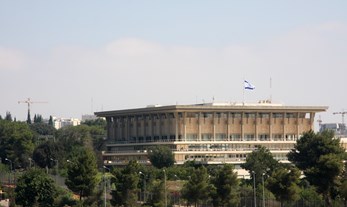
The Israeli Democracy Index 2023
The IDF and local authorities received the highest trust ratings from the Jewish public, while the political institutions were at the bottom with the lowest level. The post October 7th survey also saw a substantial increase in trust in the Israeli police.

The Disbandment of the National Unity Party Does Not Contribute To Political Stability
Written By: Dr. Assaf Shapira
The National Unity faction in the Knesset is disbanding and reverting into the two parties that composed its list of candidates in the last election. The splitting of joint lists does not contribute to political stability. It contributes to fragmentation within the political system and may be perceived as political cynicism.

Large Majority of Jewish Israelis Want Changes to the Conscription Law
Written By: Prof. Tamar Hermann, Yaron Kaplan
Most Israelis would like to see the exemption given to the Haredi community changed; when asked whether the Israel can continue relying on the US's support, public opinion was divided, with an inclination toward continued reliance; around half of Israelis think Israel's standing in the international arena is not good.

The Invisible Safeguards of Judicial Independence in the Israeli Judiciary
Written By: Dr. Guy Lurie
The Israeli democracy regulates the operation of the judiciary through the constraints of formal rules that check the political actors, the individual judges, and the judiciary. Yet beyond these formal rules, informal institutions and practices are sometimes equally important in the operation of the judiciary, as they are in any constitutional system. This article discusses informal institutions that are important in the operation and independence of the Israeli judiciary.

Explainer: The Supreme Court hearing on (non) recruitment of ultra-Orthodox men and budgeting of yeshivas
Written By: Adv. Shlomit Ravitsky Tur-Paz
What is the connection between the expiration of the conscription law and the budgets for yeshivas? What exactly was discussed in the Supreme Court and is the state in violation of the law? Bottom line, will the ultra-Orthodox be recruited, or not?
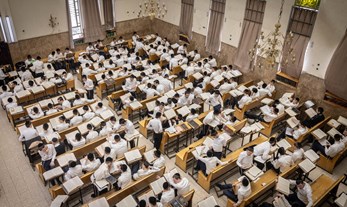
IDI Analysis: 7.3% Surge in Yeshiva and Kollel Students
Written By: Yohanan Plesner , Dr. Gilad Malach
Yohanan Plesner, president of IDI and head of the 2012 Plesner committee which sought to implement a model of "service for all," and Dr. Gilad Malach, head of the ultra-Orthodox program at IDI, share their analysis of the rapid increase in the number of yeshiva and kollel students over the past year.

Development of the Haredi Exemption Law
Written By: Prof. Yuval Shany, Adv. Mirit Lavi
The history of the ultra-Orthodox exemption from service in the Israeli Defense Force (IDF), from the 1948 until today.
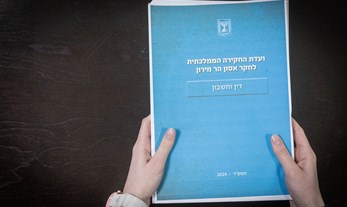
What the Mount Meron Disaster Commission of Inquiry Teaches us about a Future Commission of Inquiry on the October 7 Massacre
Written By: Dr. Dana Blander
Israel's Commission of Inquiry into the Mount Meron disaster released a report that criticizes shortcomings in the culture of accountability in Israel. The Committee distinguished between personal responsibility and ministerial responsibility and offered important recommendations, including for police operations during mass events.

Women’s Representation in Israeli Politics: Analysis for 2024
Written By: Prof. Ofer Kenig
Between 1996 and 2015, there was a real improvement in women's representation in the Knesset. Since 2015, however, it seems this upward trend has stalled and female legislative representation is faltering, especially compared to other democracies.

Preparing for Ramadan as Israel Arms Itself
Written By: Adv. Mirit Lavi
In a few days, Israel's Muslim citizens will begin celebrating the month of Ramadan. While safeguarding this ritual and protecting freedom of worship, security forces will face challenges in defending public security, as this is considered a sensitive time. With the influx Israeli citizens taking part in the civilian defense squads and licensing themselves, the police must make serious efforts to ensure all Israeli citizens feel safe.

Rabbinical Elites Versus Traditionalists: IDF Conscription Law Reveals Rifts in Shas Party
Written By: Eliyahu Berkovits
Internal struggles between factions within the Sepharadic ultra-religious movement Shas are only beginning. The absence of the unifying figure of Rabbi Ovadia Yosef is still sorely felt, and only time will tell whether the rabbinical elite or the Knesset members representing a moderate electorate will gain the upper hand.

Follow the Money: On the War, Drafting the Yeshiva Students, and the State Budget
Written By: Prof. Benjamin Porat
The legal basis for deferring military service for Yeshiva students no longer exists, removing legal justification for the transference of funds to religious institutions with students under 26. Funding for Torah study institutions is the most substantial question that needs to be addressed at the current time, when Israeli society is rethinking its relations with the Haredi public.

What happens when Israel runs out of ammo?
Written By: Dr. Jesse Ferris
With US arsenals stretched to the limit and other allies lining up for their share, it's time to forge a new defense supply channel.

When Violence Dominates Local Arab-Israeli Elections, Democracy Loses
Written By: Dr. Yael Litmanovitz, Dr. Muhammed Khalaily
Arab-Israeli public officials are being increasingly targeted by criminals, hoping to get their way through threats, extortion and force ahead of Tuesday's local elections. Running for office shouldn't cost people their lives.

Local Elections: A Much Needed Balance of Power
Written By: Dr. Ariel Finkelstein
The local elections this week in Israel—taking place at a time of war—have many Israelis asking, perhaps louder than usual, is it actually important to vote in these elections? The answer to this question is a resounding yes.

The Sanctions Against Israelis
Written By: Prof. Amichai Cohen
The US, the UK, France and other states have announced the imposition of economic sanctions on Israeli residents who are believed to be complicit in 'settler violence.' This document aims to outline the framework of international economic sanctions and contextualize the sanctions imposed on Israelis.

Bordering Beliefs: Israel’s Sociopolitical Divide Between Liberal and Ultra-Orthodox Values
Written By: Adv. Edna Harel Fisher
In Israel, social borders, political demands and the status of women continue to underscore tensions between liberal democratic values and the conservative, ultra-Orthodox Jewish communities.
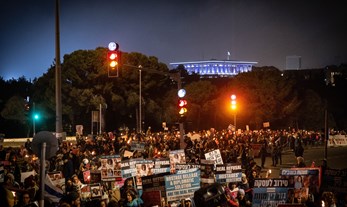
Most Israelis: an "Absolute Victory" to the War is Unlikely
Written By: Prof. Tamar Hermann, Yaron Kaplan
Most Israelis think Palestinian terrorism will remain the same or increase if a Palestinian state were declared. A vast majority (81%) of Israelis think the likelihood of reform in the Palestinian Authority is low, while a majority of Israelis think absolute victory in Gaza is unlikely.

What We Should Learn About Ourselves, On the Occasion of Facebook’s 20th Birthday
Written By: Dr. Tehilla Shwartz Altshuler
Twenty years into the social media revolution, of which Facebook is the poster child, we need to reassess and renew our fundamental democratic principles.

On Moody's Credit Downgrade: Economic Policy Change Cannot Wait.
Written By: Prof. Karnit Flug
Over the weekend, Moody’s Investors Service announced that it had downgraded Israel’s credit rating from A1 to A2 and assigned it a “negative” credit outlook. Our policymakers would be well advised to study the risk analysis and assessment in Moody’s report closely and to take all possible steps to mitigate the risks.
When the 'keyboard Mujahideen' discovered AI
Written By: Dr. Tehilla Shwartz Altshuler
Foreign Israel critics use advancements in AI, including ChatGPT, to misrepresent their actions through Hebrew translations; addressing this requires international laws to make AI developers accountable.

A More Targeted Approach to IDF Reservist Compensation
Written By: Dr. Carmit Padan
Israeli reserve soldiers are making unimaginable sacrifices to protect their country. To rise to the challenge of meeting the IDF's expanded personnel needs, Israel's policy solutions must be as diverse as are the reservists serving this nation. A "one-size-fits-all" compensation approach will not cut it.

The Political Structure of Haredi Local Authorities and Its Influence on How They Operate
Written By: Dr. Ariel Finkelstein
How are elections in ultra-Orthodox municipalities different from those in non-orthodox local authorities? Are they comparable to the Arab community? A survey an analysis of the political structure of Haredi local authorities.

Representation of Women in Elections for Local Authority Heads
Written By: Dr. Itamar Yakir, Dr. Ariel Finkelstein, Yechiel Noam
From a historical perspective, the proportion of female heads of local authorities in Israel has been extremely low—essentially negligible throughout most decades. How does women’s representation in local authorities during the first two decades of the 21st century compare?

A Large Majority of Israelis Want Early Elections
Written By: Prof. Tamar Hermann, Dr. Or Anabi
59% of Jewish Israelis oppose a deal that would lead to the establishment of a Palestinian state with guarantees from the US and peace agreements with Arab states such as Saudi Arabia; when asked to choose, 51% of Israelis said they think the main goal of the war should be bringing the hostages home and 36% think it should be toppling Hamas; half of Israelis think the ICJ ruling, issuing temporary measures, to be harsh.

The Inexcusable Absence of Women in Israeli Ministry Leadership Roles
Written By: Adv. Anat Thon Ashkenazy
Minister of the Economy Barkat's decision to remove Adv. Michal Cohen from her role as Director of the Competition Authority compounds a two-pronged problem. On the one hand, the diminishing number of women in Ministry leadership roles, and on the other, increased political interference in professional authorities, risking their independence and professional standards.
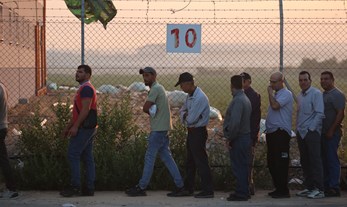
On Palestinian Workers: The Right Answer isn't Always the Easy One
Written By: Prof. Yotam Margalit
A decision to allow Palestinian workers back into Israel is not at all a simple matter. Despite recommendations by Israel's security agencies to allow entry to Palestinian workers, the Ministers of Construction and of the Economy oppose it for security reasons. As alternative solutions to the severe shortage of workers are unsatisfactory, we must ask ourselves whether we, as a country, are prepared to withstand another socioeconomic crisis.

Your Questions Answered About Israel's Wartime Local Elections
Written By: Dr. Assaf Shapira
In a few weeks elections will be held in local authorities across Israel. While they were originally scheduled for October 31st, 2023, they were postponed due to the outbreak of war. Elections during wartime raise a slew of challenges that are exceptional to the circumstances. Find out everything you need to know about wartime local elections in Israel.

Between Rhetoric and Effects: The ICJ Provisional Measures Order in South Africa v. Israel
Written By: Prof. Amichai Cohen, Prof. Yuval Shany
In its order on provisional measures, the Court appeared to engage in transactional justice. It used harsh rhetoric to describe the catastrophic situation in the Gaza Strip while minimizing the impact of the order by adopting ambiguous language on the contents and scope of the plausibility test.

